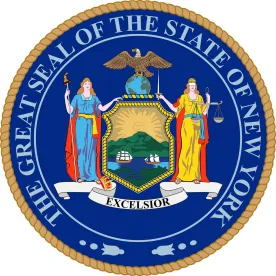On September 6, 2023, New York Governor Kathy Hochul signed a law that prohibits employers from requiring employees to attend employer-sponsored meetings the “primary purpose” of which is to communicate the employer’s opinions on religious or political matters, including relating to joining a labor organization. The new law, which took immediate effect, comes amid a wider push against so-called “captive audience” meetings.
Quick Hits
The new law makes it unlawful for employers in New York to take adverse action against employees who refuse to attend meetings, or listen to communications, the primary purpose of which is to communicate the employer’s religious or political views, including its views on the decision to join or support a union.
Employers are also required to post a notice at work locations notifying employees of their employment protections under New York Labor Law Section 201-d.
The new law took effect on September 6, 2023, expanding employment protections under New York labor law.
S4982/A6604
The new law, Senate Bill (S) 4982 and Assembly Bill (A) 6604, modifies New York Labor Law Section 201-d by making it unlawful for employers to refuse to hire, discharge from employment, or otherwise discriminate against an individual in terms of compensation, promotion, and terms and conditions of employment based on an employee’s refusal to “attend an employer-sponsored meeting … to communicate the employer’s opinion concerning religious or political matters.”
S4982/A6604 defines “political matters” as “matters relating to elections for political office, political parties, legislation, regulation and the decision to support any political party or political, civic, community, fraternal[,] or labor organization.” “Religious matters” are defined as those “relating to religious affiliation and practice and the decision to join or support any religious organization.”
The new law expressly does not prohibit:
“casual conversations” between an employer or its agent or representative and employees “provided participation in such conversations is not required”;
communicating to employees about “any information that the employer is required by law to communicate” to the extent that such legal requirement or information is necessary for employees to perform their job duties;
“a requirement limited to the employer’s managerial and supervisory employees”; or
communication by institutions of higher education to employees that are part of coursework, symposia, or academic programs at the institution.
Further, the law does not apply to “a religious corporation, entity, association, educational institution or society that is exempt from” Title VII of the Civil Rights Act or 1964 with respect to religious speech “to employees who perform work connected with the activities undertaken by” such an entity.
Under Section 201-d(7), the New York attorney general may seek an order to enjoin or restrain an alleged violation and courts may impose civil penalties in the amount of $300 for the first violation and $500 for each subsequent violation. Further, Section 201-d(7) provides that individuals alleging to have been aggrieved by a violation may bring an action seeking “equitable relief and damages.”
Additionally, S4982/A6604 requires that employers post a notice at work locations notifying employees of their employment protections under New York Labor Law Section 201-d.
Bans on ‘Captive Audience’ Meetings
The signing of S4982/A6604 makes New York the latest state to ban such so-called “captive audience” meetings, joining Connecticut, Maine, and Minnesota, which have recently enacted bans, and Oregon. For more than seventy years, the National Labor Relations Board (NLRB) has recognized an employer’s right under the National Labor Relations Act (NLRA) to require employees to attend meetings to discuss their right to refrain from joining or forming a union with some limitations on what employers may say, including limitations on threatening or coercive speech. However, the NLRB general counsel, in an April 2022 memorandum, took the position that such meetings violate the NLRA and stated an objective to overturn NLRB precedent protecting employer rights to hold such meetings.
The New York law could face legal challenges from employers arguing that it unconstitutionally restricts their First Amendment and free speech rights and that it is preempted by the NLRA. There is currently a challenge to Connecticut’s similar law on those grounds.
Next Steps
With the new law taking effect, employers in New York may want to review their practices regarding communicating with employees about religious or political matters, particularly regarding the possibility of joining or forming a union, and consider steps for compliance, including a posting in the workplace informing employees of their rights under Section 201-d.







 />i
/>i
